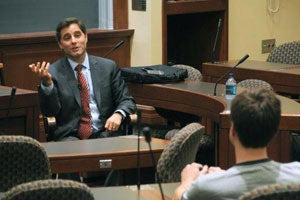As part of the Views from Washington series, Julius Genachowski,’91, Chairman of the Federal Communications Commission, came to Harvard Law School in November for a conversation with students and with Dean Martha Minow.
Genachowski, who graduated from HLS with classmate Barack Obama in 1991, said he was excited to return to his alma mater.
“It’s great to be here with Dean Minow who was a professor of mine when I was here,” he said. “Professor Minow’s father, Newt Minow, is the model that all subsequent FCC Chairs try to follow and rarely succeed.”
Genachowski said it was an unusual moment for communications in the United States and globally. Broadband technology is “obviously changing everything. Devices that are connected to the Internet are becoming more and more essential. There are extraordinary opportunities around an interconnected world.”
He added, “It’s a platform for three sets of opportunities: economic growth, innovation, and job creation for the 21st Century – in the way that electricity was in the 20th.”
“As a platform for tackling significant national challenges, it’s incredibly important.”
Genachowski cited the passage of health care reform, which included steps towards the digitization of medical records and opening expanded electronic dialogue between doctors and their patients.
He also said broadband has vast potential to improve education policy and increase students’ access to academic works and information.
Private investment—for the most part—“will fuel wire and wireless broadcast infrastructure,” Genachowski predicted.
Minow asked Genachowski about the “scarcity of spectrum” — the notion that broadband and other wireless technologies are not limitless. Current and future demand for spectrum will be greater than its actual capacity, Genachowski acknowledged.
“The reason that we could fall behind again [in mobile technology] is the spectrum shortage,” he warned.
